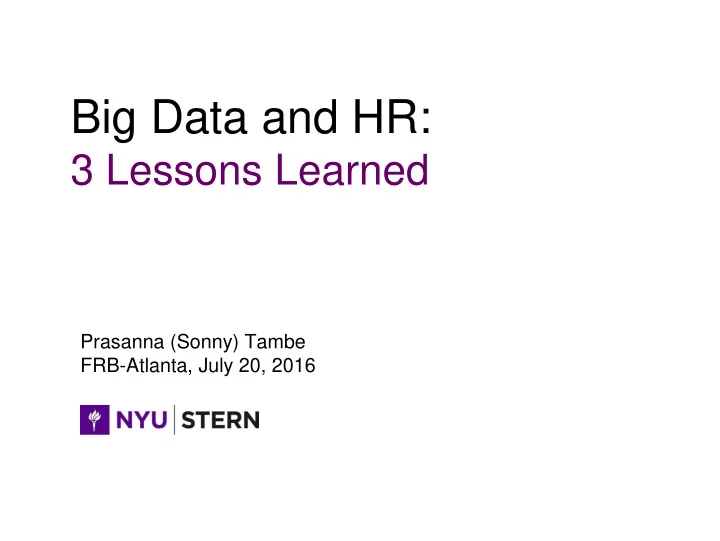

Big Data and HR: 3 Lessons Learned Prasanna (Sonny) Tambe FRB-Atlanta, July 20, 2016
“people analytics will ultimately have a vastly larger impact on the economy than the algorithms that now trade on Wall Street or figure out which ads to show us.” - E. Brynjolfsson in The Atlantic
“ Digital exhaust ” is creating a revolution in workforce science Real time labor market information Mobile phone/GPS/Location data Web links/Blog references/Facebook Socio-metric badges Email network data Employee referrals Internal digital chatter MOOC assessments Behavioral games Internal knowledge boards Discussion board posts Open source contributions Online databases of resumes Trace data from wearable devices
Data vs. Intuition HURRICANE FRANCES was on its way, barreling across the Caribbean, threatening a direct hit on Florida's Atlantic coast. Residents made for higher ground, but far away, in Bentonville, Ark., executives at Wal- Mart Stores decided that the situation offered a great opportunity for one of their newest data-driven weapons, something that the company calls predictive technology. A week ahead of the storm's landfall, Linda M. Dillman, Wal-Mart's chief information officer, pressed her staff to come up with forecasts based on what had happened when Hurricane Charley struck several weeks earlier. Backed by the trillions of bytes' worth of shopper history that is stored in Wal-Mart's data warehouse, she felt that the company could "start predicting what's going to happen, instead of waiting for it to happen," as she put it. Source: NY Times
The current frontier: Real-time labor supply Source: Tambe 2014, LinkedIn
The current frontier: Real-time labor demand Source: Tambe 2016, Burning Glass
Movement from weak to strong signals of individual job performance.
Strong signals of on-the-job performance
What can online activities tell us about workers?
What about “EQ” skills?
Better management of information work
Better measures of online and offline communication
Tying information to revenue Access to information diffusion predicts individual productivity. Each additional ‘keyword seen’ is associated with about $70 of additional revenue generated. Seeing information sooner also predicts higher productivity. An additional word seen within the first week of its emergence in the network is worth ~ $321. An additional word seen within the first month of its emergence in the network is worth ~ $115. Source: * Aral, Brynjolfsson & Van Alstyne “ Productivity Effects of Information Diffusion in Networks. ”
New battles over worker privacy .
We already trade privacy for discounts in many consumer markets
Like with credit histories, Opting-out may not be a choice
The light and dark sides of “big data and HR” ptambe@stern.nyu.edu Source: NY Times
Recommend
More recommend